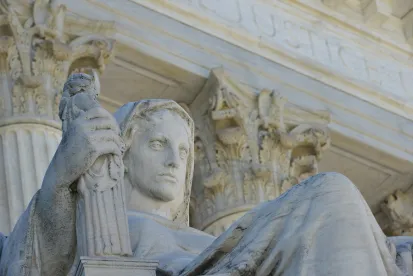In June 2020, our colleagues discussed the Supreme Court’s landmark decision in Bostock v. Clayton County, which held that Title VII forbids discrimination based on sexual orientation and gender identity. Our colleagues also cautioned employers to recognize sexual orientation and gender identity as protected characteristics moving forward (to the extent not previously recognized). In the months that followed Bostock, many questions remained regarding how the ruling might affect religious employers, including organizations, churches and schools. The Court in Bostock even previewed this potential quagmire, writing, “[H]ow these doctrines protecting religious liberty interact with Title VII are questions for future cases . . . .”
A recent Indiana district court, in Starkey v. Roman Catholic Archdiocese of Indianapolis, Inc., addressed this question head-on, tackling some of “the difficult questions that may arise when applying civil rights laws to religious institutions.”
The facts in Starkey are as follows: Roncalli High School, a private Roman Catholic school in Indianapolis, Indiana, had employed the plaintiff Lynn Starkey for almost 40 years until it terminated her employment in May 2019. Starkey, a woman, had married another woman in 2015. In March 2019, Starkey learned that Roncalli High School decided not to renew her employment contract for the following academic year because her “civil union is a violation of her contract and contrary to the teaching of the Catholic Church.” Starkey filed suit against Roncalli High School and the Archdiocese of Indianapolis, alleging, among other claims, sexual orientation discrimination under Title VII.
Congress included an exemption from Title VII for religious organizations in Section 702 of the Civil Rights Act of 1964. This exception allows religious organizations to exercise religious preferences when making employment decisions. The defendants moved to dismiss Starkey’s Title VII claim, arguing that Section 702 barred her claim as a matter of law because her same-sex marriage violated the Roman Catholic Church’s teachings and the preferences of Roncalli and the Archdiocese.
The district court in Starkey, however, disagreed. The judge interpreted Section 702 narrowly, noting that, “the exception for religious institutions applies to one specific reason for an employment decision — one based upon religious preference,” and noted that religious employers “remain subject to the provisions of Title VII with regard to race, color, sex or national origin.” Moreover, and in harmony with Bostock, the court in Starkey highlighted Title VII’s “but-for” standard of causation, noting that “[s]o long as the plaintiff’s sex was one but-for cause of that decision, that is enough to trigger the law. The court concluded that the defendants’ arguments with respect to Section 702 could not stand, writing, “Defendants’ argument would allow a religious employer to convert any claim of discrimination on the basis of one of the protected classes under Title VII to a case of religious discrimination, so long as there was a religious reason behind the employment decision.” Ultimately, the court held that while Section 702 allows religious employers to give preference to employees who are of the same religion, it does not permit them to “do so in a way that also discriminates against another protected class.”
The defendants filed an appeal on November 20, 2020, and we expect the U.S. Court of Appeals for the Seventh Circuit will soon have the opportunity to weigh in on questions related to the intersection of Title VII’s protections against sexual orientation and gender identity discrimination, and Title VII’s religious organization exception. It is also worth noting the procedural posture of the Starkey case (on a motion for judgment on the pleadings), and there may be additional arguments or evidence marshalled at a later phase in this litigation. That said, this decision is one of the first addressing the intersection of Title VII post-Bostock and a religious organization’s employment decisions related to an employee’s sexual orientation or gender identity, and it could foreshadow future disputes and court rulings in this developing area of the law. We will continue to monitor these important developments.





 />i
/>i
